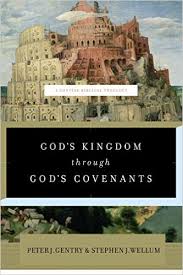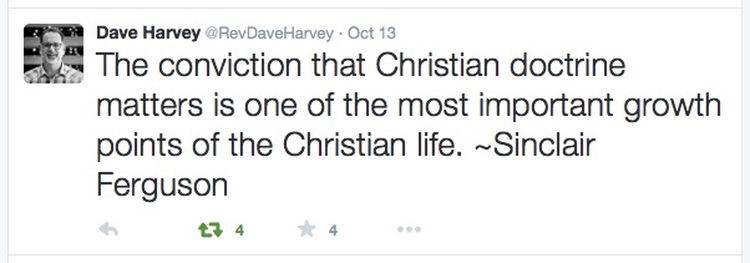|
Yesterday I added a couple more things I like to have on my radar screen as I teach (and prepare) - in addition to my initial list of "teaching aims" that I developed a while back. Well, when you start thinking about something (specifically, in this case, what are the things I want to have on my radar screen and pursue as I teach?), it's easy for that "something" to keep growing. Such is the case with this topic. As I've continued to think about what I'm aiming for as I teach (spurred along by conversations and focused thought), here's one more "aim" I don't want to ignore: Find Connections with Those You're TeachingTeaching isn't one-sided. Or at least it shouldn't be. The interactive environment that teaching allows is one of the things I love about it - you prepare like crazy, but then you "create as you go" in the art of teaching itself. Since teaching isn't one-sided, that means good teachers should be thinking about connecting with those they're trying to teach. This involves anticipating questions, showing care and concern, inviting (and valuing) interaction in appropriate ways, putting themselves in the shoes of those they're teaching, etc, etc, etc. This emphasis doesn't neglect solid, life-changing content (remember that we want to faithfully present as well!); it does acknowledge that while content is king, it's not a dictator. Good content surrounds itself with helpers. Good content is enhanced by making strong connections with those we're teaching.
0 Comments
Awhile back, I wrote on five things I'm aiming for when I teach. Rather than trying to "finish" people's education in a certain area or being a slave to "fads", I instead try to (1) faithfully present the material, (2) further understanding of a particular topic, (3) frame the topic well so others have some sort of blueprint by which to understand things, and (4) fix misunderstandings so people aren't walking in error. All of this is part of an even larger goal for my teaching to be one piece (not the only piece) of helping (5) form disciples of Jesus Christ.
As I've continued to teach and reflect on what my overarching aims are, I've identified two more "aims" that help guide my instruction and keep me pointed in the right direction. Reading books on biblical and systematic theology can be a great way to grow in our knowledge of (and love for!) God and His Word. I was recently reminded of the value of reading these sorts of books, as I dug a bit more deeply into how we should think about "covenants" in the Bible.
To someone who's new to reading the Bible, the word "covenant" may sound abstract and intimidating. But that's not the case! "Covenant" - at a very basic level - refers to a relationship that is forged between two people (or parties). Covenant is about relationship. And as we read through the Bible - both Old and New Testaments - covenant language keeps coming up that pushes the storyline along. God exists in relationship with Adam and Eve in the Garden of Even. God enters into covenantal relationship with Noah, Abraham, Israel (often called the Mosaic Covenant), and David. The Old Testament looks ahead to a New Covenant, which is ultimately fulfilled in Christ (even if the full experience of that New Covenant has elements that remain future). Here's the bottom line. Covenant is about relationship (in this case, relationship with God!). And covenant comes up a lot in the Bible. Both of these things should alert us to the value of having some basic understanding of covenant. Enter: Peter Gentry and Robert Wellum, and their recent God's Kingdom through God's Covenants: A Concise Biblical Theology (Crossway, 2015). Here's an excerpt from the book (pp. 255-56) that is saturated with depth, meaning, and implication: It's common in American culture to talk about "personal mission statements" and finding our "calling" or that primary thing we're "about." The basic idea is that every individual has a contribution they can make. As God's image bearers, not only does every life have value; every life has purpose. On a macro-scale, that purpose is to glorify God and follow the lead He gives humanity all the way back in Genesis - to create and cultivate (e.g. Genesis 1:28; 2:15).
But I believe God's purposes for us also warrant individual, micro-scale consideration. How has God uniquely built me to bring Him glory and cultivate the things I can? What passions do I have that - after honest searching - I feel are from God? To paraphrase the famous words of Frederick Buechner, where does my greatest joy meet the world's great needs? For me, this has been (and continues to be) a process. The stuff I'm "about" has stayed broadly consistent over a long period of time, but the image continues to get sharper as I keep going (and as near as I can tell). In a short phrase, a statement that galvanizes me like very few other things do is this: "Unleash the Word." Here (very briefly) is a lot of what this involves: Last Sunday in the Brookside Institute "Walking Wisely: An Introduction to Biblical Ethics" class, we turned the corner away from laying foundations for thinking ethically, to looking more closely at specific issues that deserve some ethical consideration.
And the first thing we looked at are what I like to call "ethical blindspots." We all know what a blindspot is in our cars, right? They're those spots we can't see using the side or rear-view mirrors. If we're not careful, there can be a car in our blindspot that we're not even aware of. And if we try to move into that space, accidents happen! In the same way, I think there can be ethical blindspots in our lives - issues that deserve moral reflection that we're not even aware of - perhaps because of all the good that goes along with the issue, because the issues are new, or because of the cultural "water" we swim in. Thus far in the Brookside Institute class, "Walking Wisely: An Introduction to Christian Ethics," we've spent a lot of time (4 out of 10 sessions!) laying foundations for the rest of the class - for the upcoming sessions when we get into thinking ethically about technology, the sanctity of life, God's design for marriage and sexuality, and more.
What are the areas that we need to factor in, if we want to lay strong foundations in this field (and practice) of Christian Ethics? Why are these so important? I'm glad you asked! Let's look at both of these questions together. I ran across this quote from Christian theologian and teacher Sinclair Ferguson (I noticed this via Dave Harvey, pastor and author, via Twitter). I did a little bit of additional digging, and it looks like this quote comes from Sinclair Ferguson's book, The Christian Life: A Doctrinal Introduction. I happen to agree with Sinclair Ferguson on this point - which won't come as much of a surprise if you've spent some time exploring the Brookside Institute blog posts on theology and catechesis. The question I encourage you to reflect on (and comment on here!) is this: HOW is Christian doctrine "one of the most important growth points of the Christian life"? Or, stated another way, how will Christian growth be stunted if we neglect Christian doctrine?
What Are Some Good Resources for Family Devotional Time? Here's a few to Have on Your Radar Screen.10/13/2015 As a Christian dad, one of the things I'm "about" is raising my four boys to know and love God. I can't create gospel-change in them, but I want to do what I can to cultivate a heart that responds to the gospel in them.
But (at least in my own experience) I also know how tough it is to do this. Schedules get crazy busy, and so good intentions don't pan out. When we do create time to gather for family devotions, it feels like there's always one or two kids that are creating distractions. Lightning doesn't strike often in terms of "aha moments" and profound prayer requests. And yet we keep doing family devotions - in all of their imperfections, and not always as consistently as I'd like. But we keep at it. And as we keep at it, I'm always on the look out for resources that can help my wife and I teach our kids the Bible and point them towards Jesus. Below I've listed some resources I've got on my radar screen that fit into this category of family devotions and discipling our kids.
This upcoming weekend I'm teaching on Christianity and culture in the Brookside Institute "Walking Wisely" class on Christian Ethics. I found this video (length: 14:22) and think it has some worthwhile stuff to say on this topic. Listen especially to how what's said relates to issues of culture, Christian identity, and hope.
All the way back to my 9th grade year in public high school, I remember learning about "vestigial organs" in biology class. (For all of you whose eyes just glazed over because I referenced high school biology, stick with me for a minute.) Basically, vestigial organs are often understood to be organs we still have but don't need. Those who hold to an evolutionary development of humanity would say that perhaps these organs at one time played a key role in our functioning, but over the course of evolutionary development have become unnecessary.
Wikipedia says that "Vestigiality refers to genetically determined structures or attributes that have apparently lost most or all of their ancestral function in a given species, but have been retained during the process of evolution." The same webpage goes on to say that "Vestigiality, biologically speaking, refers to organisms retaining organs, which have seemingly lost the entirety of the original function." Now, I'm not advocating for a naturalistic, evolutionary approach to human origins. Nor am I ignoring the controversy that can accompany the discussion of vestigial organs. (I'll leave those topics to well trained Christian scientists for now!) What I want to do in this post is take this understanding of vestigial organs and apply it to the church as the body of Christ. Here's my question: Is adult equipping a "vestigial organ" in the body of Christ? Let me get even little more specific. Was intentional, structured, relatively-comprehensive biblical and theological training necessary at one time, but as time has gone on this sort of equipping is no longer necessary? |
Tim WiebeChristian. Husband. Father. Pastor. Learner. Contributor. Reader. Categories
All
Archives
June 2024
|
© 2014-2024 | 11607 M Circle, Omaha NE, 68137 | www.thebrooksideinstitute.net










 RSS Feed
RSS Feed
